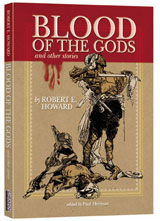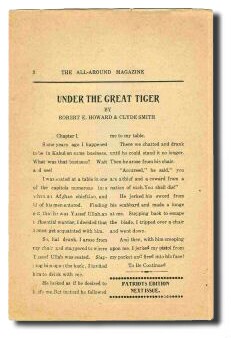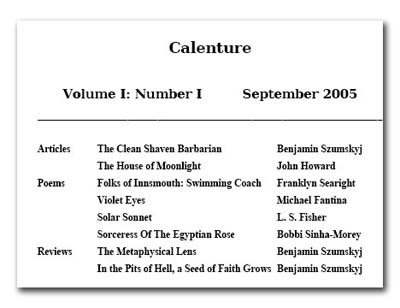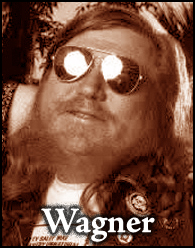Herron vs. Joshi Smackdown
Thursday, October 13, 2005
posted by Leo Grin
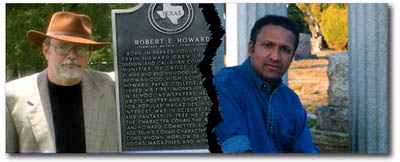
I recently read some perceptive comments on the TTA Press Discussion Forum about two of the Big Names in the Weird Fiction field, S. T. Joshi and Don Herron. The posts were intriguing because they did not come from the usual crowd. These are not fans plugged into the main Howard scene, and hence are people who are judging the merits and demerits of Joshi and Herron objectively.
On the forum, under the Joel Lane folder, there is a discussion thread about Joshi. It gets interesting when Joel says on Wednesday, November 24, 2004:
There should be an emoticon for the pensive but resigned frown… I’m continuing this topic from the Nemonymous board to canvass thoughts on this extraordinary critic and archivist–a man whose sharp insights and sarcastic barbs are as impressive as his blind spots and biases are frustrating.
He is, of course, speaking about the inimitable S. T. Joshi. Gary Fry asks, “Well, I’ve only read the Campbell book. What else should I seek?”, to which Joel responds:
The Lovecraft biography is a serious classic. Joshi’s recent book The Modern Weird Tale is a mixed bag, highly idiosyncratic and unfair, but full of good insights. His new book The Evolution of the Weird Tale, despite its grand title, is basically a collection of review articles; but it’s enormous fun and less narrow than some earlier Joshi stuff. The Weird Tale, published in 1990 and covering the weird fiction genre from Machen to Lovecraft, is ambitious and dynamic but heavy-handed and too fond of extreme statements. Behind the veils of academic objectivity, Joshi can be seen to be a volatile, short-tempered, aggressive and highly intense young man. He has mellowed a little since, though his sarcasm can still wither at forty paces.
Howard fans can only laugh–that’s almost exactly the rep Joshi has acquired in our neck of the woods. Some “good,” “ambitious,” and “dynamic” insights, marred far too often by “highly idiosyncratic,” “unfair,” “heavy-handed,” “extreme,” “volatile,” and “short-tempered” critical judgments.
Joel later adds:
And the latest news is that the two volumes of revised, annotated Lovecraft stories edited by S.T. Joshi for Penguin Modern Classics is to be followed by a third containing… everything else! ‘The Dreams in the Witch-House’ will be out in the UK next year and will complete the set of revised Lovecraft texts in mass market paperback. I’m not sure whether to be impressed by this purposeful rebranding of Lovecraft’s work or disappointed that the opportunity to consign the dozen or so weakest stories to the dustbin of history was missed.
When asked about other books in the field to look up, Joel mentions Herron:
Well, there’s the ‘Penguin Encyclopedia of Horror and the Supernatural’, about 20 years old now. And the St James Encyclopedia of Horror, Ghost and Gothic Fiction, a massive and costly volume which I don’t own–I wrote six entries, but didn’t qualify for a comp. copy.
There’s some very good stuff on the horror genre in Ramsey Campbell, Probably, as well as much else of interest (and the occasional foray into the realm of Too Much Information). And Don Herron’s excellent anthology of essays on Robert E. Howard, The Dark Barbarian, has recently been reissued by Wildside Press.
Can anyone recommend other studies of the field?
To which Gary Fry responds “Don Herron is an excellent critic: he wrote some very even-handed reviews of King’s earlier work.” And a bit later says:
Don Herron’s take on King is, in my view, the definitive assessment: he claims King writes the kind of fiction you’d expect from a professor (loaded with theme and symbols, ripe for critical dissemination), rather than a raw artist. However, he also claims that King, at his best, could produce great stuff (not Shakespeare, but great all the same): “Apt Pupil,” The Shining, “The Woman in the Room,” etc. Nevertheless, he also claims that King can’t control the quality, that he only ever hits to high notes occasionally.
Sums the guy up nicely, methinks.
Another reader, “Stu,” chimes in on Don’s take on King with:
Gary, I’ve not read a lot of King but that does sound a more balanced assessment than a lot of people offer on him. Way more charitable than Joshi’s take on King, for example.
There you have it, guys outside of Howard fandom simmering with many of the same evaluations of Joshi and Herron that we have historically had. Joshi is blissfully unaware of how many intelligent fans his criticism has offended on an aesthetic level over the years, how plain wrong many of his opinions are, by any standards. I wonder if he’ll ever figure it out.
Joel finishes the Joshi commentary with:
Yes, I think King’s vast popularity has blinded some critics to the power of his best work. The Dark Half in particular is brilliant. He’s not terribly original, but he is passionate and intense–features that most commercial horror fiction notably lacks. Joshi’s grandstanding denunciation of King is the most disappointing feature of his criticism, though he does offer a fair-minded critique of Straub.
“Disappointing” is one of the words I hear most associated with Joshi’s critical work. Oh well, bad criticism fades away when the living critic does, while good research–Joshi’s strength–endures. My guess is that books like The Weird Tale, The Modern Weird Tale, and The Evolution of the Weird Tale will fade into merciful oblivion in due course, while the various indexes, pure texts, and biographical finds will become standards.
Meanwhile, Herron’s critical books on Howard, as far as I can tell, are here to stay. For each essay contained within, one finds it very difficult to think of another essay anywhere that has covered the same subjects better.

